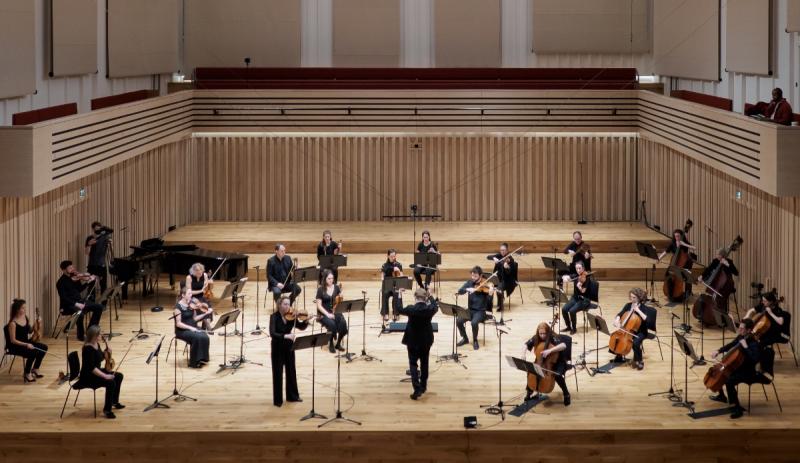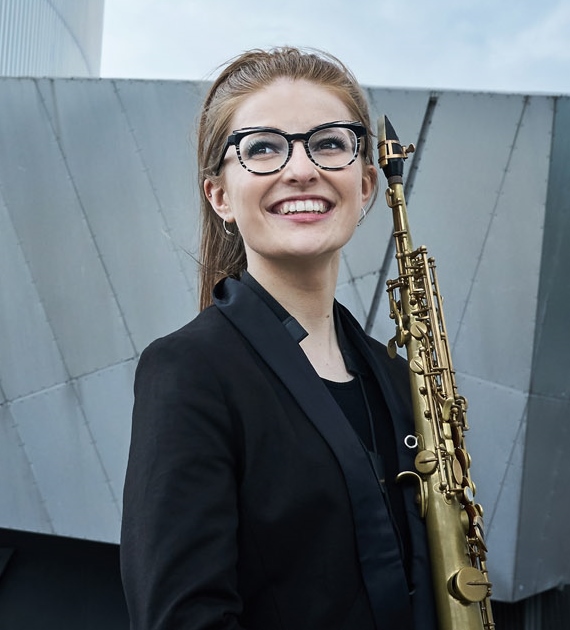Gillam, Manchester Camerata, Kuusisto, Stoller Hall online review - calm and exhilaration | reviews, news & interviews
Gillam, Manchester Camerata, Kuusisto, Stoller Hall online review - calm and exhilaration
Gillam, Manchester Camerata, Kuusisto, Stoller Hall online review - calm and exhilaration
Time stands still and enthusiasm cheers the spirits in a concert for the present

Manchester Camerata’s performance with Jess Gillam at Chetham’s School of Music was filmed in private on 9 January (and the sound was broadcast on BBC Radio 3 on the 19th), but to see it in its full visual glory we had to wait until a one-off
The music was two meditative, time-stands-still pieces for strings (the presentation derived its title of “All Time is Eternally Present” from T S Eliot, quoted by Daniel Kidane to introduce the second of them, a piece commissioned from him and receiving its world premiere) and two lively and very cheerful ones: the latter no doubt intended to lift the spirits, and very effective at doing so, too.
Dawn, by Dobrinka Tabakova, was written for Gidon Kremer and Kremerata Baltica in 2007 and this time featured solo violin (Caroline Pether) and solo cello (Hannah Roberts). It’s meant to evoke sunrise, being part of a dawn-day-dusk triptych, and with its slow pulse, rich sustained harmonies and effective use of the strings’ sonorities it does so quite gloriously. The soloists’ lines dovetailed and duetted sensitively with each other, while Kuusisto’s own string playing experience bore skilful fruit in the flow of suspension and resolution in the orchestral sound.
 Knowing there was Aaron Copland’s music to come, it was tempting to hear something of his voice in the melodic intervals and tonal chording of Tabakova’s music – but the real thing, in the form of the Symphonic Suite from Appalachian Spring (reduced back to the ballet’s original 13-instrument scoring) was a breath of fresh air. Maybe the opening and recurring scene-setting numbers sounded a trifle pedestrian, with no stage presentation to see and no audience even to imagine it (and the piano’s balance level was very prominent), but the dance rhythms were so perky and such fun that the absence of actual hoofers hardly left one any sense of missing out. Mandy Burvill’s clarinet and Amina Hussain’s flute solos were tender and evocative, and the muted solo violin from Caroline Pether at the end was beautifully played.
Knowing there was Aaron Copland’s music to come, it was tempting to hear something of his voice in the melodic intervals and tonal chording of Tabakova’s music – but the real thing, in the form of the Symphonic Suite from Appalachian Spring (reduced back to the ballet’s original 13-instrument scoring) was a breath of fresh air. Maybe the opening and recurring scene-setting numbers sounded a trifle pedestrian, with no stage presentation to see and no audience even to imagine it (and the piano’s balance level was very prominent), but the dance rhythms were so perky and such fun that the absence of actual hoofers hardly left one any sense of missing out. Mandy Burvill’s clarinet and Amina Hussain’s flute solos were tender and evocative, and the muted solo violin from Caroline Pether at the end was beautifully played.
Daniel Kidane’s Be Still, for string orchestra and bowed crotales, is quite definitely the music of 2020, reflecting (as he says) on the experience of lockdown and losing the everyday markers of passing time: but it’s also intended to create inner stillness and calm. Beginning with high tremolo strings, almost pulse-less, it extends their sound through the orchestra’s compass, as a rhythm begins and chords form fleetingly, building to a crescendo and ending with a lofty solo violin over a sustained sound carpet. It’s no criticism to say that with that title and such stated intentions, it does exactly what it says on the tin.
Jess Gillam’s role in the performance (the saxophonist pictured above) was to bring her soprano saxophone to the solo role in Michael Nyman’s 1991 one-movement concerto, Where the Bee Dances (originally written for John Harle). She brought her familiar charm and virtuosity to its engaging melodic variations and foot-tapping rhythms, with the now chamber-orchestra-sized Camerata responding in precision and enthusiasm – and at the end with their applause and even a few whoops. Rightly so: they’d together created a kind of heart-filling exhilaration, which is just what we all need now.
rating
Share this article
The future of Arts Journalism
You can stop theartsdesk.com closing!
We urgently need financing to survive. Our fundraising drive has thus far raised £49,000 but we need to reach £100,000 or we will be forced to close. Please contribute here: https://gofund.me/c3f6033d
And if you can forward this information to anyone who might assist, we’d be grateful.

Subscribe to theartsdesk.com
Thank you for continuing to read our work on theartsdesk.com. For unlimited access to every article in its entirety, including our archive of more than 15,000 pieces, we're asking for £5 per month or £40 per year. We feel it's a very good deal, and hope you do too.
To take a subscription now simply click here.
And if you're looking for that extra gift for a friend or family member, why not treat them to a theartsdesk.com gift subscription?
more Classical music
 BBC Proms: Barruk, Norwegian Chamber Orchestra, Kuusisto review - vague incantations, precise laments
First-half mix of Sámi songs and string things falters, but Shostakovich scours the soul
BBC Proms: Barruk, Norwegian Chamber Orchestra, Kuusisto review - vague incantations, precise laments
First-half mix of Sámi songs and string things falters, but Shostakovich scours the soul
 BBC Proms: Alexander’s Feast, Irish Baroque Orchestra, Whelan review - rapturous Handel fills the space
Pure joy, with a touch of introspection, from a great ensemble and three superb soloists
BBC Proms: Alexander’s Feast, Irish Baroque Orchestra, Whelan review - rapturous Handel fills the space
Pure joy, with a touch of introspection, from a great ensemble and three superb soloists
 BBC Proms: Moore, LSO, Bancroft review - the freshness of morning wind and brass
English concert band music...and an outlier
BBC Proms: Moore, LSO, Bancroft review - the freshness of morning wind and brass
English concert band music...and an outlier
 Willis-Sørensen, Ukrainian Freedom Orchestra, Wilson, Cadogan Hall review - romantic resilience
Passion, and polish, from Kyiv's musical warriors
Willis-Sørensen, Ukrainian Freedom Orchestra, Wilson, Cadogan Hall review - romantic resilience
Passion, and polish, from Kyiv's musical warriors
 BBC Proms: Faust, Gewandhausorchester Leipzig, Nelsons review - grace, then grandeur
A great fiddler lightens a dense orchestral palette
BBC Proms: Faust, Gewandhausorchester Leipzig, Nelsons review - grace, then grandeur
A great fiddler lightens a dense orchestral palette
 BBC Proms: Jansen, Royal Concertgebouw Orchestra, Mäkelä review - confirming a phenomenon
Second Prom of a great orchestra and chief conductor in waiting never puts a foot wrong
BBC Proms: Jansen, Royal Concertgebouw Orchestra, Mäkelä review - confirming a phenomenon
Second Prom of a great orchestra and chief conductor in waiting never puts a foot wrong
 BBC Proms: Royal Concertgebouw Orchestra, Mäkelä review - defiantly introverted Mahler 5 gives food for thought
Chief Conductor in Waiting has supple, nuanced chemistry with a great orchestra
BBC Proms: Royal Concertgebouw Orchestra, Mäkelä review - defiantly introverted Mahler 5 gives food for thought
Chief Conductor in Waiting has supple, nuanced chemistry with a great orchestra
 Dunedin Consort, Butt / D’Angelo, Muñoz, Edinburgh International Festival 2025 review - tedious Handel, directionless song recital
Ho-hum 'comic' cantata, and a song recital needing more than a beautiful voice
Dunedin Consort, Butt / D’Angelo, Muñoz, Edinburgh International Festival 2025 review - tedious Handel, directionless song recital
Ho-hum 'comic' cantata, and a song recital needing more than a beautiful voice
 Classical CDs: Dungeons, microtones and psychic distress
This year's big anniversary celebrated with a pair of boxes, plus clarinets, pianos and sacred music
Classical CDs: Dungeons, microtones and psychic distress
This year's big anniversary celebrated with a pair of boxes, plus clarinets, pianos and sacred music
 BBC Proms: Liu, Philharmonia, Rouvali review - fine-tuned Tchaikovsky epic
Sounds perfectly finessed in a colourful cornucopia
BBC Proms: Liu, Philharmonia, Rouvali review - fine-tuned Tchaikovsky epic
Sounds perfectly finessed in a colourful cornucopia
 BBC Proms: Suor Angelica, LSO, Pappano review - earthly passion, heavenly grief
A Sister to remember blesses Puccini's convent tragedy
BBC Proms: Suor Angelica, LSO, Pappano review - earthly passion, heavenly grief
A Sister to remember blesses Puccini's convent tragedy
 BBC Proms: A Mass of Life, BBCSO, Elder review - a subtle guide to Delius's Nietzschean masterpiece
Mark Elder held back from blasting the audience with a wall of sound
BBC Proms: A Mass of Life, BBCSO, Elder review - a subtle guide to Delius's Nietzschean masterpiece
Mark Elder held back from blasting the audience with a wall of sound

Add comment